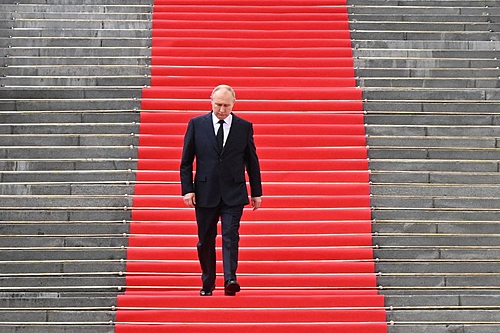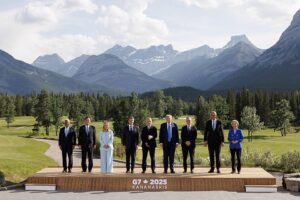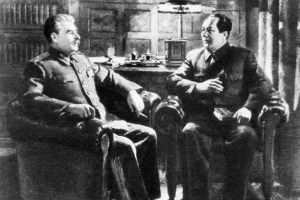
Russian President Vladimir Putin confirmed on December 8th that he will run as a candidate in the 2024 presidential elections, which will be held between March 15th and 17th next year. The election promises to be predictable and confirm Putin’s fifth term, given the absence of viable candidates. However, the continuation of the war in Ukraine, which will have completed two years, is a political factor that could disrupt the Kremlin’s strategy.
Putin’s announcement was made in an unusual way. Without the official congresses of his party, United Russia, or formal statements to the press, the information was released during a conversation with a commander who participated in the war in Ukraine, at a ceremony in the Kremlin to award medals to soldiers who participated in the conflict. . When all the award winners at the ceremony approached the president in an informal conversation, Lieutenant Colonel Artem Zhoga asked if Vladimir Putin would confirm his candidacy for re-election, to which the president agreed.
In his response, Putin said that it was impossible not to adopt this decision and thanked the support of the military personnel present.
“I will not hide that at different times I had different thoughts. But now you are right, now is the time to make a decision. I will run for the post of President of the Russian Federation,” Putin said.
:: Vladimir Putin announces that he will run for a fifth presidential term in Russia in 2024 ::
The confirmation of his candidacy is not surprising, but Putin had not yet openly declared his willingness to seek re-election, avoiding answering questions on the topic in recent months. The expectation is that the election will confirm his fifth term as head of the Kremlin. There is currently no viable opposition that threatens the current head of state.
President of Russia, Vladimir Putin, talks with Lieutenant Colonel Artem Zhoga, about his decision to participate in the next elections. / Mikhail Klimentyev/AFP
For comparison, in the last presidential elections in 2018, Putin won with 76.69% of the vote, followed by Pavel Grudinin (Communist Party) with 11.77% and Vladimir Zhirinovsky (Liberal Democratic Party) with 5.65%. In 2021, the Central Election Commission excluded Pavel Grudinin from the list of candidates of the Communist Party of the Russian Federation for the 2021 State Duma elections. He was accused of financial irregularities committed in the 2018 pre-election campaign. Zhirinovsky died in 2022.
Politicians openly critical of the Kremlin and committed to removing Putin from power, such as Alexey Navalny and Ilya Yashin, are already in prison. Other politicians considered to represent the Russian opposition, such as Maxim Kats, Dmitry Gudkov, Garry Kasparov, among others, are outside Russia and have no influence on political processes within the country.
In this context, Putin continues to maintain high popularity in Russia and unquestionable authority for the vast majority of the population. According to a survey by the Levada Center institute, released in October this year, Vladimir Putin has the approval of around 80% of the population. The level of popularity was 5% higher than the index in September 2022, when the announcement of a mobilization of civilians for the war in Ukraine caused a drop. At the end of February 2022, when the president announced the start of the war, his approval rating increased.
In an interview with Brazil in fact, political scientist Abbas Gallyamov, who worked as a speechwriter for Putin in 2008 and 2010, stated that the Kremlin’s intention will be to demonstrate a result superior to the percentage of the last elections, predicting a margin that could vary between 77% and 80%. %. According to the analyst, it will be important for the Russian government to present a better result than in 2018 “so that no one thinks that Putin is losing popularity due to the war.”
The constitutional changes in Russia in recent years demonstrate that an eventual succession is not in the Kremlin’s plans. Still in 2008, the duration of the presidential term increased from four to six years, a change applied to presidents elected after the 2012 elections, that is, when Putin would return to the presidency of the country. In 2020, a referendum promoted by the government approved constitutional changes that allow the president to be re-elected after two consecutive terms in office. In other words, in practice, according to the current Constitution, Putin can remain in power until 2036.
However, the continuation of the war in Ukraine and a possible setback on the front line could cause problems for Putin’s election campaign. According to Abbas Gallyamov, if the situation at the front starts to worsen drastically for the Russian army, “this could become a very serious fact that could disrupt the government’s game.”
“In this situation, Putin’s campaign, with its rosy optimism and positivity, will seem completely out of touch with reality, his campaign will suffer a collapse. That is, a key factor that can influence the electoral process is the external factor, because everything in Russia’s internal politics is settled. Putin has broad control over the political system and the electoral system”, he argues.
Kremlin does not hide that re-election is certain
The Kremlin considers the re-election of President Vladimir Putin to be certain. Also in October, spokesman Dmitry Peskov stated that the Russian president had no competitors in the Russian presidential elections, and “nor could he have”. Before that, in August, Peskov said that the Russian elections are not exactly democratic, predicting a victory of more than 90% for Putin.
“Our presidential elections are not really democracy, they are an expensive bureaucracy. Putin will be re-elected next year with more than 90% of the votes,” he said
Later, Dmitry Peskov sought to clarify the statement:
“Putin will be elected, I am personally confident of this, based on the level of consolidation of society around Putin. […] Elections, although they are a requirement of democracy, and Putin himself has decided to hold them, but theoretically they do not even need to be held. Because it is already obvious that Putin will be elected. This is my absolutely personal opinion,” he stated.
‘Systemic opposition’
The deadline for nominating candidates ends on January 1st and the tendency is for the main Russian political parties to nominate candidates who are in favor of the Kremlin’s game. Abbas Gallyamov explains that these candidates nominated by the parties make up what is understood as a “systemic opposition”.
“The official candidates will be called by representatives of the political parties that are represented in parliament, what we call ‘systemic opposition’, they will play their usual role, they will represent a certain democracy, that is, they will show that ‘the people they have a choice’, that Putin is not a usurper of the elections, he is like any other democratic leader, that the elections have opponents. In other words, they will seek to demonstrate that citizens have a choice”, he explains.
The political scientist and director of Russia’s “Group of Political Experts”, Konstantin Kalachev, in a recent interview with the Russian portal Bfm.ru, also believes that political parties will be represented in the elections by “verified people”, which should not lead to surprises in the electoral process, but voter turnout can be a problematic indicator. Voting is not mandatory.
“I think there will be no surprises, the main problem of this campaign is turnout. But party political mobilization and simply patriotic appeals must play a role, and the three-day vote must be justified,” he adds.
According to Kalachev, “whoever is for Putin will go to the polls, whoever is against will stay at home. Candidates from parliamentary parties will be voted on by their core electorate.”
:: Politics in Ukraine and the war: understand the controversy over the presidential elections in the country ::
In an article published on his Telegram channel, Kalachev highlights that the systemic opposition does not represent an alternative and does not fight for power. “Voters sense a problem and are no longer particularly willing to give mandates to opposition parties. What is the point? What for? The party system is evolving into a one-and-a-half party system, where there is one party in power and a combined half of ‘opposition’ parties”, he comments.
Holding the elections amid the war in Ukraine, however, creates a dilemma for the Kremlin. For political scientist Abbas Galyamov, the absence of a candidate with a different vision and criticism of Putin’s military campaign could call into question the legitimacy of the elections. According to him, the Kremlin could adopt “a useful but very risky move of allowing a candidate who is against the war.”
“All the candidates of the official political parties are in favor of war, and as the main issue on the political agenda concerns war, the absence of an anti-war candidate on the electoral ballot automatically takes away the meaning of these elections, voters can realize that It’s a kind of farce,” he argues.
The political scientist notes that elections are necessary to strengthen presidential legitimacy, not to weaken it, so it would be necessary to allow such a candidate, “but in a way that he does not cause disruption, remains under control, and ultimately moment, keep around 2% and gradually withdraw”.
“Of course it would be good for the Kremlin if they had an anti-war candidate on the ballot, but that is very risky, so I think they are oriented towards minimizing risks. I believe they will give up on this scenario and there will not be a candidate like that”, he adds.
Editing: Thalita Pires

Source: www.brasildefato.com.br

